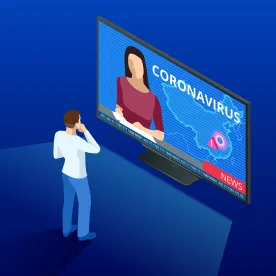On April 23, 2021, the New York state legislature delivered a copy of the Health and Essential Rights Act (the “HERO Act” or the “Act”) to Governor Andrew Cuomo for signature. The legislation was created as a response to COVID-19 safety concerns as New Yorkers return to in-person work, and designed to fill gaps created by expiring COVID-19-related executive orders. If enacted, the HERO Act would require the New York Department of Labor (“NYDOL”) to issue enforceable minimum workplace health and safety standards, and would also impose significant new health and safety obligations on employers in the state. Because Governor Cuomo is expected to sign the bill into law, New York employers should be aware of the HERO Act’s implications and take necessary steps to prepare for compliance.
New Health and Safety Standards for New York Employers
As written, the HERO Act would require the NYDOL to establish industry-specific minimum requirements for preventing exposure to airborne infectious diseases within thirty days of the bill becoming law. The Act sets forth a list of topics that must be addressed by the NYDOL’s standards, including employee health screenings, face coverings, personal protective equipment, hand hygiene, cleaning and disinfecting, social distancing, and compliance with mandatory or precautionary orders of quarantine. All New York employers, regardless of size, would subsequently be required to: (i) implement a health and safety plan that meets or exceeds these standards; (ii) post that plan in the workplace; and (iii) distribute a copy of the plan to all employees. Employers who fail to adopt a plan would be subject to a penalty of at least $50 per day until a plan is implemented, and employers who fail to comply with an adopted plan could be subject to fines ranging from $1,000 to $10,000.
Employees May Bring Claims for Non-Compliance
In addition to civil fines, the HERO Act creates a private right of action for employees, who may bring a claim for injunctive relief against their employer for failing to comply with relevant health and safety standards. Courts may award up to $20,000 in liquidated damages and attorneys’ fees to a prevailing plaintiff under the Act, unless the employer “proves a good faith basis to believe that the established health and safety measures were in compliance with the applicable airborne infectious disease standard.” Retaliation against employees who report a plan violation or refuse to work if they reasonably believe that the workplace exposes them to health and safety risks is prohibited, and may give rise to a separate cause of action.
Joint Labor-Management Workplace Safety Committees
The HERO Act would also require employers to permit workers to establish and administer a “joint labor-management workplace safety committee.” At least two-thirds of any such committee must consist of non-supervisory employees, and it must be co-chaired by both an employer representative and a non-supervisory employee. The HERO Act authorizes such committees to: (i) raise health and safety concerns, to which the employer must respond; (ii) review any employer policy required by the HERO Act or the New York Workers’ Compensation Law and provide feedback; (iii) review any workplace policy promulgated in response to any health or safety law; (iv) participate in any site visit by a government entity responsible for enforcing health and safety standards; (v) review any employer health and safety report; and (vi) regularly schedule a meeting during work hours at least once per quarter. Committee members must also be permitted to attend training associated with their role without loss of pay. Retaliation against committee members is prohibited and punishable by a civil fine of up to $10,000. Committee members who believe that they have suffered retaliation may also assert claims in court, and may recover liquidated damages and attorneys’ fees.
The HERO Act stands to impose significant new obligations on employers as employees begin to more consistently return to in-person work. If Governor Cuomo signs the Act, New York employers should be prepared to rapidly comply with NYDOL standards, which must be issued thirty days from the date that the bill becomes law. Employers should also make a plan to implement and distribute adopted health and safety plans, and provide managers with both policy compliance and anti-retaliation training. Finally, New York employers should prepare to include joint labor-management workplace safety committees in decisions regarding workplace health and safety. We will continue to monitor this legislation and provide updates regarding the HERO Act as new information becomes available.
The legal landscape continues to evolve quickly and there is a lack of clear-cut authority or bright line rules on implementation. This article is not intended to be an unequivocal, one-size fits all guidance, but instead represents our interpretation of where applicable law currently and generally stands. This article does not address the potential impacts of the numerous other local, state and federal orders that have been issued in response to the COVID-19 pandemic, including, without limitation, potential liability should an employee become ill, requirements regarding family leave, sick pay and other issues.



 />i
/>i
